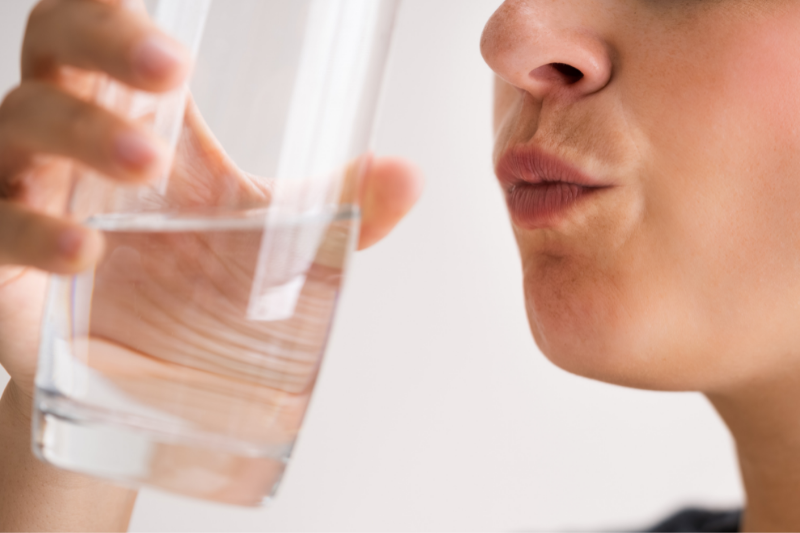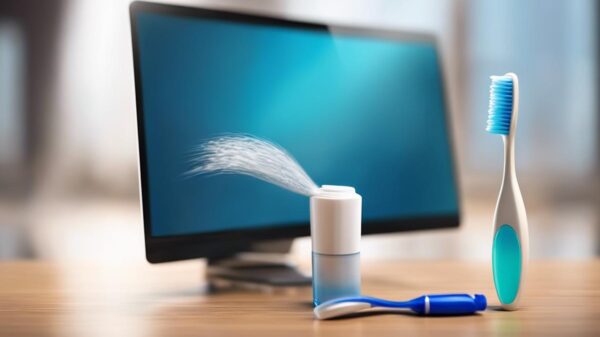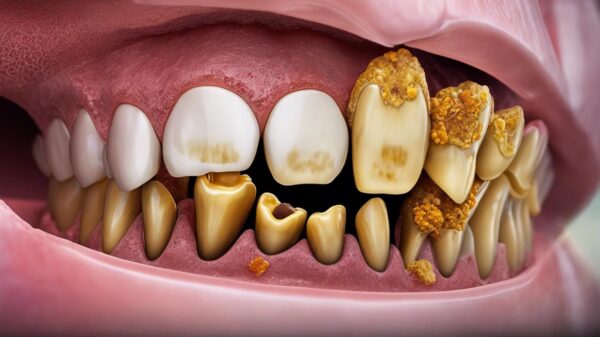How Salt Water Mouth Rinses Benefit You
Mouth rinses are often used to help soothe mouth irritations, provide anti-inflammatory benefits, and kill bacteria. Recently, I’ve been trying to stick to more natural alternatives, like saltwater rinses. After much trial and error with alternative products, I found that saltwater mouth rinses are extremely effective and offer a variety of benefits.
What are the benefits of saltwater mouth rinses? The benefits of saltwater mouth rinse include killing bacteria, helping to relieve mouth irritation or pain, lubricating mucus membranes, removing food debris from teeth, reducing gingivitis risk factors, preventing halitosis (bad breath), and providing anti-inflammatory benefits. It also makes sense that saltwater mouth rinse might replace conventional mouthwashes because it’s easy to make at home with common ingredients.
Saltwater works so well, that it’s hard to ever go back to normal mouthwashes. The number of benefits and healing properties that are found in saltwater rinses will surely make you reevaluate what mouthwash is sitting in your medicine cabinet.
The Many Benefits of Saltwater Mouth Rinses
Let’s take a closer look at a few of the many benefits of using saltwater mouth rinses.
1. Kills Bacteria
 Saltwater mouth rinse is great for killing bacteria that cause dental caries, gingivitis, and oral infections. Because salt has antiseptic properties it will kill any bacteria in the mouth, which can prevent mouth infections.
Saltwater mouth rinse is great for killing bacteria that cause dental caries, gingivitis, and oral infections. Because salt has antiseptic properties it will kill any bacteria in the mouth, which can prevent mouth infections.
2. Soothes Mouth Irritations
One of the biggest benefits of saltwater mouth rinse is that it helps alleviate mouth irritation or pain that may be caused by oral sores, mouth ulcers, cold sores, oral piercings, tooth decay, gum disease, acid reflux, tonsillitis, and other mouth conditions.
The antiseptic properties eradicate bacteria while also soothing burning sensations common with mouth problems.
3. Lubricates Mucous Membranes
By lubricating mouth membranes, saltwater mouth rinse helps to prevent mouth ulcers. It also relieves mouth dryness and prevents mouth bleeding.
4. Removes Food Debris from Teeth
Saltwater mouth wash can remove food debris stuck between teeth. This can reduce bad breath odors, tooth decay risk, and bacteria buildup.
5. Reduces Gingivitis Risk Factors
As mentioned above, saltwater mouth rinses are known to help reduce gingivitis risk factors by reducing the amount of plaque buildup that occurs on teeth.
Plaque build-up is one of the main causes of gum disease and cavities because it irritates your gums causing them to become inflamed or swollen (gingivitis).
6. Prevents Halitosis (Bad Breath)
Bad breath can be caused by mouth bacteria and food debris. Saltwater mouth rinse is very effective at killing mouth bacteria, preventing bad breath, and controlling mouth odors.
7. Provides Anti-Inflammatory Benefits
The anti-inflammatory benefits of saltwater mouth rinse also help reduce tooth decay or gingivitis. This is because it can relieve swelling and redness in the mouth caused by various conditions such as oral piercings, food allergies, tonsillitis, mouth ulcers, mouth sores from radiation treatment, and acid reflux disease.
What Is the Best Way to Use Salt Water Mouthwash?
The best way to use saltwater mouthwash is with a teaspoon of salt in an eight-ounce glass of warm (not hot) water. You should spit the saltwater mouth rinse and not swallow it. Salt can be harmful in higher concentrations.
Also, you should never use a salt water mouth rinse if you have an open wound or sore in your mouth or throat, such as a canker sore or cold sore (herpes simplex infection). Salt may sting open wounds. Salt mouth rinse can be used up to three times daily. If using it more than this, discuss it with your dentist or physician first.
Is Salt Water Rinse A Good Idea?
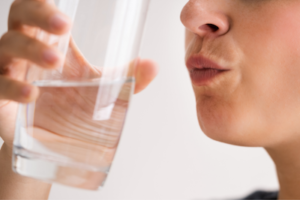 Mouth rinses are used for conditions including halitosis (bad breath), stomatitis (mouth sores), gingivitis, oral dryness or ulcers, bad taste in the mouth, pain from dental procedures, post-extraction care, skin lesions, and mouth irritation.
Mouth rinses are used for conditions including halitosis (bad breath), stomatitis (mouth sores), gingivitis, oral dryness or ulcers, bad taste in the mouth, pain from dental procedures, post-extraction care, skin lesions, and mouth irritation.
Saltwater mouth rinse has been shown to provide anti-inflammatory benefits, kill bacteria, reduce inflammation, lubricate mucus membranes, remove food debris from teeth, and lower plaque formation risk.
This type of mouth rinse is also utilized because it’s inexpensive and easy to make at home with common ingredients. Saltwater rinses have no side effects like mouthwash can have (e.g., nausea, vomiting), and don’t increase oral dryness or ulcer formation risk.
You can use it as often as needed for conditions that require antimicrobial therapy. Plus, since saltwater mouth rinse has been used as a mouthwash for so long, it’s already available in most homes.
Conventional Mouthwashes vs. Salt Water Rinses
There are several reasons why you might want to rinse your mouth with salt water instead of conventional mouthwashes:
- Saltwater mouth rinse is often used as a natural alternative to conventional mouthwash for many health concerns such as oral candidiasis/thrush (oral thrush), mouth sores, mouth pain or soreness, mouth ulcers, halitosis (bad breath), dry mouth symptoms, and others.
- There are many antibacterial benefits found in saltwater mouth rinses. Saltwater mouth rinse may kill bacteria more effectively than conventional mouthwash because salt is naturally antimicrobial.
- Saltwater mouth rinses may have less risk of side effects than some conventional mouth rinses. Some people are allergic to ingredients found in many commercial types of mouthwash. This can cause swelling of the tongue or throat, difficulty breathing, an itchy sensation in the mouth or throat, headaches, dizziness, and nausea or vomiting. However, not much scientific evidence exists to support this theory.
- Saltwater mouth rinses are less expensive than most mouthwashes, though some traditional mouthwashes with antimicrobial qualities also tend to be less expensive than many commercial bottles of mouthwash with added fluoride benefits.
How to Make Salt Water Mouth Rinse More Effective
Do not use mouth rinses if you have mouth sores, mouth ulcers, open wounds in your mouth or throat, an allergy to mouthwash ingredients, or a weakened immune system from a chronic condition such as HIV/AIDS. Try drinking water and eating healthy foods instead. It may take a few days for mouth problems to get better when there’s no mouthwash available.
Salt Water Mouth Rinse Tips
- Try adding 1/2 teaspoon of salt in 8 ounces of warm water for babies children weighing less than 30 pounds (13 kg). Do not use mouth rinses with salt in this age group unless told to by your dentist or doctor.
- Do not rinse for longer than one minute at a time when using mouthwash, as doing so will decrease its effectiveness.
- Let dry completely after rinsing mouthwash before taking another drink of water, eating, smoking cigarettes, etc. This will help to avoid diluting the mouthwash’s benefits and antibacterial properties with more water from saliva production.
- Drink plenty of non-caffeinated liquids to stay hydrated while using mouthwash since caffeine dehydrates tissues and diminishes mouthwash effects. Simply choosing a carbonated beverage instead can be less healthy because it can irritate your mouth tissue further during treatment.
- Avoid brushing your teeth or using mouthwash for at least 30 minutes after using a saltwater mouth rinse. Doing so will lessen the mouthwash’s effectiveness by removing some of its antibacterial properties with scrubbing, which can damage vulnerable mouth tissue even further.
- Be sure to spit mouthwash out instead of swallowing it during the treatment period to avoid an accidental overdose on salt or mouthwash ingredients that may cause serious health problems if too much is consumed.
- Pregnant women should not use mouth rinses unless instructed by their doctor. This is because many types of mouthwash contain alcohol and chemicals that may harm an unborn baby (fetus).
- Don’t rinse if you have had any type of mouth surgery in the past month or are currently experiencing jaw pain, mouth sores, mouth ulcers, mouth or throat trauma, newly restored dental work (fillings, crowns, bridges), open wounds in the mouth or throat area. Wait until you speak to your dentist before using mouthwash in these instances.
How Did Mouthwash Come To Be?
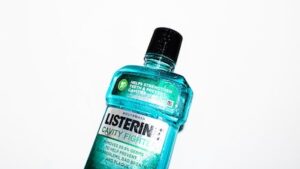 Mouthwash was first used in the 1930s when Listerine antiseptic mouthwash was released. Before mouthwashes, saltwater mouth rinse was considered a home remedy for oral health ills. Mouth rinsing is listed as an early practice in several texts on dental care.
Mouthwash was first used in the 1930s when Listerine antiseptic mouthwash was released. Before mouthwashes, saltwater mouth rinse was considered a home remedy for oral health ills. Mouth rinsing is listed as an early practice in several texts on dental care.
In the 1800s mouthwash was used for more than just oral health care, but also a treatment for eye, ear, and throat infections. Since mouth rinsing is such an old practice, it’s difficult to know the exact date mouthwash was developed.
What Makes a Good Mouthwash?
One of the main ingredients mouthwashes contains is alcohol. Alcohol mouth rinses can help dry mouth symptoms, but mouthwashes also include other active ingredients such as antimicrobials and surfactants – chemicals that lower surface tension and improve mouthfeel. Sufficient mouth rinse effects require a mouthwash that has the right pH, mouthfeel, flavor, and antimicrobial effectiveness.
Saltwater mouth rinse is made using salt – sodium chloride – to create a 0.9% solution of saltwater. You can make your saltwater mouth rinse by adding approximately one teaspoon of salt to eight fluid ounces of warm water. This creates a mouthwash with the same pH as commercial mouthwashes.
In Conclusion
Saltwater mouth rinse has many benefits. Its natural high salt concentration draws out mouth bacteria. The rinsing process kills those bacteria as well as those that may be left behind in your mouth. Using a saltwater mouth rinse can provide you with fresher breath and protect the enamel of your teeth from harmful bacteria.
Saltwater mouth rinses are available for purchase at many pharmacies or online. This makes it easier to keep up good oral hygiene habits.



